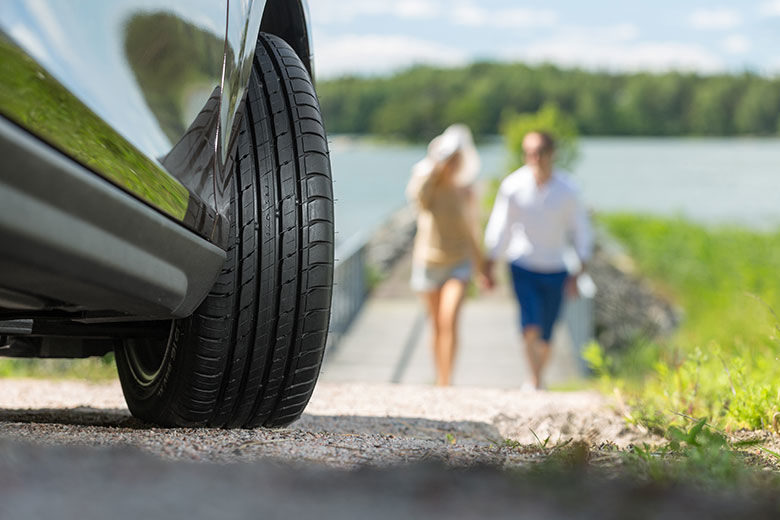Product news
Save money and the environment with Class A tyres
Driving burdens the environment, but a car is a necessity for many of us. However, an ecologically aware driver can easily reduce the environmental impact of their vehicle by following a few simple rules. And, best of all: protecting the environment also means you are saving money.

Well-maintained Class A tyres save money and improve safety
In terms of the environment, tyres that offer Class A fuel economy are the best choice for your car. Tyres in this top category of the EU tyre label have the lowest rolling resistance and, therefore, require the smallest amount of energy –and therefore fuel – to roll. "Rolling resistance refers to the energy consumed in the deformation that takes place when the tyre grips the road. Tyres with a lower rolling resistance save more energy, thereby also saving fuel and the environment. The rolling resistance of tyres accounts for up to 20 percent of the car's fuel consumption," explains Matti Morri, Technical Customer Service Manager for Nokian Tyres.
The fuel economy is indicated on the tyre's EU tyre label with a letter ranging from A to G: class A tyres have the lowest rolling resistances and class G tyres have the highest. Tyre labels should be compared before purchasing, as there can be major differences between the rolling resistances of tyres. A difference of 40 percent in terms of rolling resistance can affect fuel consumption by an average of 5–6 percent. For example, Nokian Tyres' class A summer tyre offers a saving of up to 0.6 litres per 100 kilometers compared with tyres in rolling resistance class G. If a car can save 0.6 litres per 100 kilometers and fuel costs approximately EUR 1.50 per liter, this adds up to savings of 240 litres and EUR 360 over 40,000 kilometers.
Once you have fitted fuel-efficient tyres, it is time to start maintaining them. “For example, rotating your tyres from front to rear and vice versa when changing them ensures even wear and maximises the total mileage you can get out of a set of tyres,” says Matti Morri.
Correct inflation pressure reduces emissions
When it comes to being green, monitoring tyre pressures is perhaps the most important part of tyre maintenance. Correct inflation pressure directly affects the tyre’s rolling resistance, thereby reducing emissions. You should check your inflation pressure regularly; approximately once every three weeks and always before setting off on a longer trip, since the pressure will not remain stable inside the tyre. A tyre that is at the correct pressure will reduce rolling resistance by up to ten per cent.
“If the pressure is too low, the rolling of the tyre will become heavier and the car will consume more fuel. In the interest of fuel efficiency, you should inflate your tyres some 0.2 bar higher than the car manufacturers recommend. You should also increase the pressure when the car is very heavily loaded. Increasing the pressure also improves the tyre’s load-bearing capacity and stability and reduces heat generation. These will directly affect the tyre’s durability and longevity,” Morri tells us.
Premium tyres are sustainably manufactured and properly recycled
Many consumers notice that environmentally-friendly tyres are often more expensive, but they soon pay for themselves in terms of savings on fuel costs. Premium manufacturers also invest in environmentally-friendly raw materials for tyres and in improving production processes to make them as ecological as possible. The most significant environmental impact caused by tyres is due to the fuel consumed when the tyres are used, but quality tyre producer aim to reduce the environmental impact throughout the tyre's life cycle.
"For example, we do not use any environmentally-harmful oils to manufacture our tyres – we have replaced them with low-aromatic oils and highly environmentally-friendly rapeseed and tall oils. In addition, the waste created during production, such as non-vulcanized rubber waste, is sent directly for re-use," says Nokian Tyres' Environmental and Responsibility Manager, Sirkka Leppänen.
It is a good idea to investigate the environmental responsibility of tyre manufacturers in advance. One way to do this is to read corporate responsibility reports published on their websites. Responsible tyre manufacturers strive to reduce the environmental impact of their products, all the way from production to recycling.
More information on Nokian Tyres summer tyres can be found here: https://www.nokiantyres.com/tyres/passenger-car/summer-tyres/
High resolution photos can be downloaded here:
www.nokiantyres.com/CE-summer-tyres
Contact
For more information, please contact
Jaroslav Nálevka, PR manager McCann Prague, 00420 725 865 874, [email protected]
Zuzana Michalová, PR manager Nokian Tyres CE, 00420 603 578 855, [email protected]